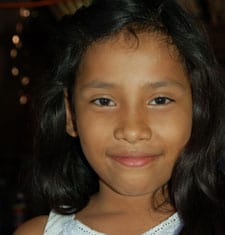Nicaragua has a population of nearly 6 million. More than half the population is under 18 years of age, and child labor affects approximately 10 percent of these children and adolescents.
“Child labor is every work activity that children and adolescents do before turning 18 years old that affects their physical, social, intellectual, psychological and moral development.” — International Labour Organization
Poverty is a key contributor in child labor. Usually children work because they have to support their families or because they have been abandoned. Many children work because they come from a home headed by a single mom.
The type of work children do varies depending on the area where they live. Many children in urban areas work in the informal sector of the economy, selling on the street, guarding cars at parking lots, collecting garbage, or working at small businesses without benefits. In the rural area, children have more physically demanding jobs.
In the neighborhood where Ciudadanos del Reino Student Center is located, not many children work. Those who do work sell tortillas, find firewood for home use or for sale, work with parents, or do other small tasks.
Their grandmother, Anselma, says, “If Cristel’s dad had a job and helped us, I wouldn’t have to do this. I would be watching them more and they would not go out.”
Anselma used to work, but her workplace closed, and so three months ago she began to make tortillas for the family sustenance. The tortillas are ordered by neighbors or by small businesses around Cristel and Ismaiel’s house.
“Cristel goes because she likes it and because there is no one else to do it. Her help is important for me and she begins to value work,” says Anselma.
Cristel says, “I do it because it is important to eat.”
Cristel was abandoned by her mother. Her father is drunk most of the time, and her grandma is responsible for Cristel and her brother. Eleven people live at the house that consists of two small bedrooms and a living room. Three are adults and the rest are children. Only one has a job at a factory, and the others make the tortillas.
“Not having her mother around affects Cristel’s behavior very much. At her home, she doesn’t know whom to obey and becomes rebellious. We have taken her twice to the psychologist, but not very much progress has been seen,” says Katherin, Curriculum Coordinator at the center.
“Cristel presents better behavior while at the center but keeps much resentment in her and if someone hurts her, she doesn’t say anything but cries. When that happens we talk to her and pray with her.”
“Cristel tries to handles the abandonment situation but it affects her,” says Jennifer, one of Cristel’s teacher. “Sometimes she becomes very hyper and she doesn’t care if we let her grandma know about it. However, she participates a lot in class and gets along very well with the class.”
Cristel’s situation worries the center’s leadership team members, who have included the child labor topic and all that it implies in the orientation they gives to parents. The center leadership is especially concerned because child labor exploits and abusees children, and in many cases these children cannot attend school or do not have good health.
According to Ivonne Tuckler, the Compassion Partnership Facilitator, centers do not currently have any statistics on child labor; however,
“We know that it exists and are beginning to introduce the topic to each center so that we can start a study and find ways to stop this situation that begins with dysfunctional families. Some parents believe it is necessary for their children to work because that’s a way to generate income for the home.
“We want to find alternatives to work with parents, to classify the causes, and give the necessary follow-up. There is a saying that many parents use: ‘We didn’t learn anything and we haven’t died, and our children won’t either.’ The parents have made this a generational issue. We do not want that for children, and that’s why we have to make some decisions and find solutions.”
It’s time, actually past the time, to give Cristel and children like her the freedom to just be a kid.

